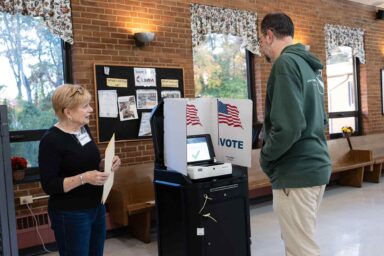If this election comes down to vice presidential candidates, Democrats must be feeling pretty good today.
|
Listen To This Story
|
Sure, running mates generally don’t decide elections (unless they refuse to participate in coups, like Mike Pence did in 2020). However, the last two presidential races have come down to a few thousand votes in a handful of states, so anything a vice presidential candidate can do to make a difference counts.
There are multiple ways in which they can do that. First of all, they can balance the ticket in some way, e.g., demographically, geographically, ideologically, etc.
They could also help deliver a particular state.
Perhaps most importantly, however, they have to effectively communicate their party’s message to attract the kinds of voters to whom the presidential candidate may not appeal (enough)… and that includes being likable.
Now, if you compare how JD Vance and Tim Walz stack up along these lines, the difference could hardly be more pronounced.
Let’s first look at the Republican.
Vance is, essentially, the stereotypical MAGA Mini Me. He is a 40-year-younger and less effective version of Donald Trump.
He won’t need to deliver his home state of Ohio because, if the GOP can’t win that, Republicans will be facing a landslide loss anyway. The same applies even more to Kentucky and West Virginia, in case anybody wants to argue that Vance’s “Appalachian roots” would move the needle there.
As for the message, he does nothing that Trump doesn’t do himself… Vance just does it more poorly.
Oh, and people don’t like him.
There are a couple of reasons for that.
For one, on a ticket consisting of two men running against just the second major party female presidential candidate, he is trying his best to antagonize women.
Finally, Vance is a phony. He will say whatever it takes to whomever is necessary to get ahead.
And then there is Walz.
He does balance the Democratic ticket, both demographically and geographically.
Yes, if Minnesota is in play, then the Democrats are in trouble.
However, as the preferred choice of organized labor, he can talk to blue-collar Americans in the midwestern swing states in a way that Kamala Harris probably cannot.
Walz is also a different kind of communicator than the vice president. He is folksy. That’s not only a contrast to Harris but also to Vance, who is smug.
The Minnesota governor, who helped pioneer the effective “Republicans are just weird” strategy, can get the message across differently than Harris, i.e., there are multiple ways in which the Democratic platform can resonate with voters.
Finally, Walz doesn’t seem at all polished like so many other politicians who employ an army of image consultants (that, by the way, used to be one of Trump’s strengths. Early on in his political career, Americans liked that he didn’t hide who he is… until they increasingly realized that they don’t like his personality).
It’s tough to see how moderate Americans wouldn’t find Walz likable. They may not agree with his message, but at least he is authentic.
And that’s perhaps the way in which he can make the biggest difference in this race.
Yes, Republicans pretended to be enthusiastic about Harris’s choice (as they would have no matter whom she picked), but they likely hope that this election does not come down to which vice presidential candidate Americans like most.
Obviously, this contrast would be most pronounced when the two share a stage. It’s tough to see how Vance could come out ahead in that, in part because Walz seems like a guy who can shrug off attacks and go on the counteroffensive.
That, in turn, will excite the Democratic base. After watching their party play defense for too long, they want a fighter… and Walz gives them that.




